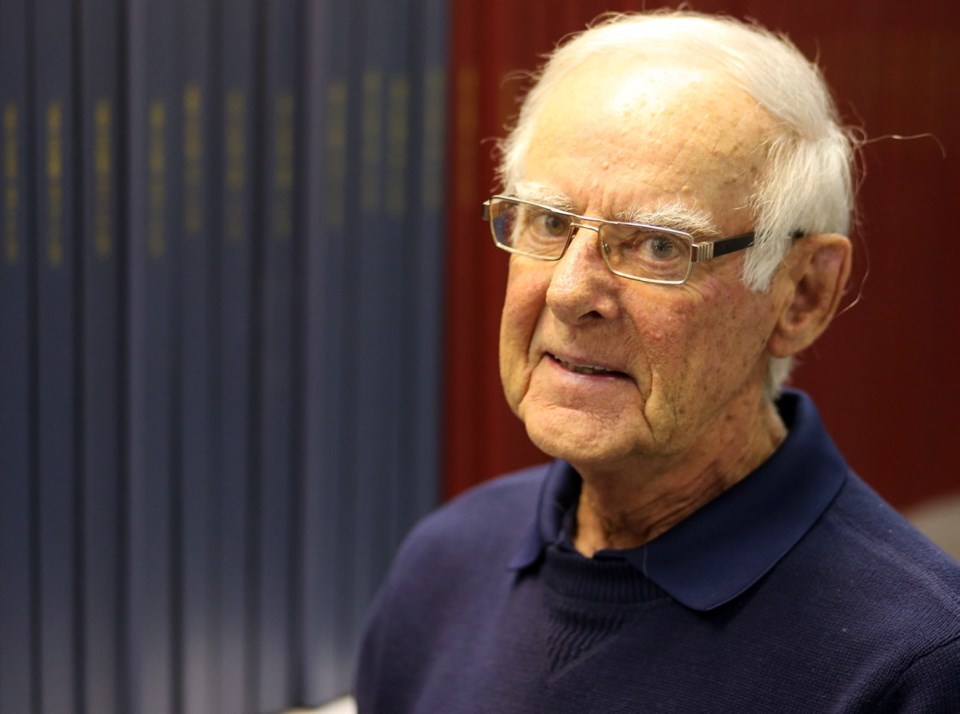Kidney transplant patient Ken Merkley has one regret — not asking his six brothers and sisters to give him one of their kidneys.
“Don’t be like I was,” Merkley advises renal patients with failed kidneys. “I’ve got six brothers and sisters, and I was reluctant to talk to them.”
“I’m pretty sure one of them would have been a good match,” he said. But “my nephrologist agreed with me and allowed me to stay on dialysis when I could have got a kidney transplant much sooner.”
Merkley, now 72 and living in Metchosin after two kidney transplants, has recently published a book called Ending the Waiting Game, Increasing Kidney Transplants in Canada.
He said he wrote it to convince patients with kidney disease to be more assertive about getting themselves a transplant.
Merkley said other people needing kidney transplants have rented billboards looking for someone willing to become living organ donors.
And he even gave credit to Victoria’s Kevin Campbell, who needed a transplant and took to wearing a T-shirt around town emblazoned with “I NEED A KIDNEY.” Campbell found a willing donor in a distant relative living in Edmonton.
“People like me need to be more assertive in finding help,” Merkley said.
His renal disease started to reveal itself when he was 37 and a flight navigator with the Canadian Forces. Merkley started to lose his appetite and was always feeling sick to his stomach. Doctors said it was likely the flu and prescribed antibiotics.
By the time somebody performed some simple blood tests and took Merkley’s blood pressure, he was in deep trouble. The Forces flew him from Chatham, N.B., to Halifax, where he was immediately put on dialysis, a treatment he underwent for the next two years.
Dialysis artificially cleanses the blood of a patient after the body’s own blood filters, the two kidneys, have failed.
Hemodialysis removes the blood from a patient, filters it through a machine and then replaces it. Peritoneal dialysis fills the patient’s body cavity with a fluid that draws out impurities from the blood.
Merkley, a hemodialysis patient, said he underwent the process three times per week. It always left him feeling fatigued and ill.
He was kept alive. But his flying days were over. The Canadian Forces posted him to Royal Roads, then a military college, to instruct officer cadets. But the dialysis was so draining, Merkley said, he had a hard time keeping up mentally with his students.
“Dialysis is not a good life,” he said.
After two years sitting on the waiting list, he received his first donated kidney and his life came back.
“You are back to Square 1 in terms of your health after a transplant,” he said.
Another reason for Merkley writing the book is to alert people about what he sees as the failing transplant system in B.C.
When he received his first kidney transplant in 1980, the average wait in B.C. was about two years, which is the length of time he waited. Now, he says, the average wait time in B.C. is about five years.
The reason is that more people require kidney transplants. The growing number of people who are obese has led to increasing rates of diabetes, and both conditions raise the blood pressure, which is hard on the kidneys, often causing them to fail.
“More and more people are getting kidney disease,” Merkley said.
Furthermore, many people in B.C. have not kept up with the donor registry. The province once had a system where people indicated their willingness to be organ donors by affixing a small sticker to their driver’s licences.
That was changed in 1997 to a computerized registry. But many people still don’t know about the switch.
Merkley said a recent poll revealed 36 per cent of people in B.C. believe they are registered donors because they put a sticker on their driver’s licence decades ago. But only 18 per cent of people in the province have actually completed their registration.
“There is a real lack of awareness,” he said.
Merkley also said it’s time Canadians started talking about things like “presumed consent.”
That means patients pronounced brain dead are automatically considered organ donors unless they have registered as not being willing. Spain has such a system.
He would also like to see some discussion about the idea of paying people to become donors. It’s not necessarily a bad idea when the expense of dialysis to the health-care system is considered, he said.
Furthermore, people can live perfectly well with one kidney.
When Merkley’s first donated kidney failed after 18 years, his daughter volunteered to donate one of hers. And the match was near perfect.
“She was the best donor I could have had and I’ve had this kidney now for 15 years,” he said. “And when she said she wanted to donate, I was not at all reluctant to accept.”
Merkley said he also has an adult son and frequently jokes he might be calling on him next.
“I kid him, saying: ‘If I need another one, it’s going to be you,’” he said.
“I have a different philosophy about it now after living many, many good, good years after receiving a transplant,” said Merkley.
To learn more about transplants in B.C., including how to register, check out transplant.bc.ca.



